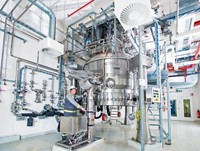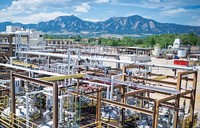Advertisement
Grab your lab coat. Let's get started
Welcome!
Welcome!
Create an account below to get 6 C&EN articles per month, receive newsletters and more - all free.
It seems this is your first time logging in online. Please enter the following information to continue.
As an ACS member you automatically get access to this site. All we need is few more details to create your reading experience.
Not you? Sign in with a different account.
Not you? Sign in with a different account.
ERROR 1
ERROR 1
ERROR 2
ERROR 2
ERROR 2
ERROR 2
ERROR 2
Password and Confirm password must match.
If you have an ACS member number, please enter it here so we can link this account to your membership. (optional)
ERROR 2
ACS values your privacy. By submitting your information, you are gaining access to C&EN and subscribing to our weekly newsletter. We use the information you provide to make your reading experience better, and we will never sell your data to third party members.
Vaccines
Covid-19
Croda lands US funding for Pennsylvania lipids plant
Project follows UK firm’s 2020 acquisition of an Alabama producer
by Rick Mullin
June 30, 2022
| A version of this story appeared in
Volume 100, Issue 24

Two years after acquiring Alabama-based Avanti Polar Lipids, Croda says it plans to build a second US lipid facility at a site it purchased in Lamar, Pennsylvania, a year ago.
Croda, which also manufactures lipids in Leek, England, will receive $75 million in funding from the US Department of Defense and the Biomedical Advanced Research and Development Authority as part of the federal government’s effort to bolster domestic supply of critical drug and vaccine ingredients.
The British firm says it will spend up to $58 million, bringing its total investment in the plant to $133 million.
Demand for lipids has soared in recent years with the development of messenger RNA (mRNA) vaccines. Naked mRNA quickly degrades in the body. To get the genetic material to its target cells, vaccine developers combine it with a mixture of several sophisticated lipids to form lipid nanoparticles. Croda supplies Pfizer with lipids for its COVID-19 vaccine.
Croda’s news follows a similar arrangement between Evonik Industries and the US government in which the German firm will establish a lipid facility in Lafayette, Indiana. The US will finance $150 million of the $220 million project. Evonik supplies BioNTech with lipids for its COVID-19 vaccine.“L
ipid formulations are very popular and getting more popular,” says James Bruno, president of the consulting firm Chemical and Pharmaceutical Solutions. “The ability to get drugs out of the stomach helps a number of drugs and could increase bioavailability. Also, getting more production in the US only sweetens the deal politically.”




Join the conversation
Contact the reporter
Submit a Letter to the Editor for publication
Engage with us on Twitter